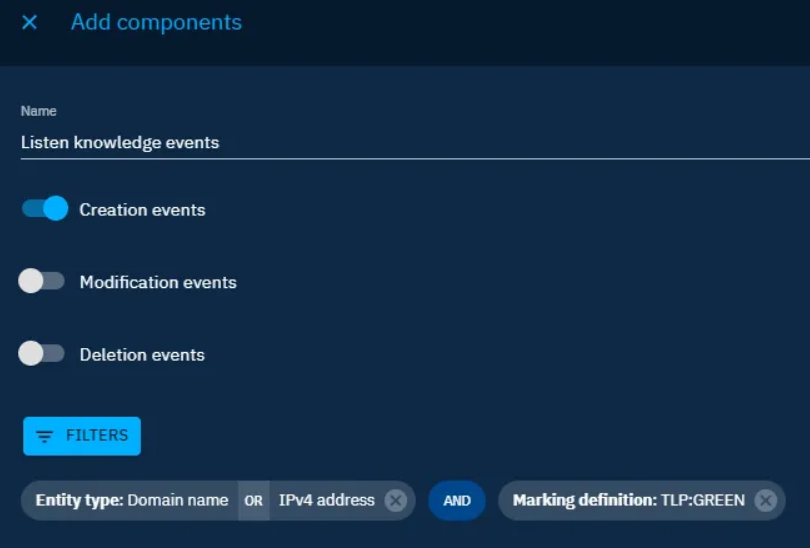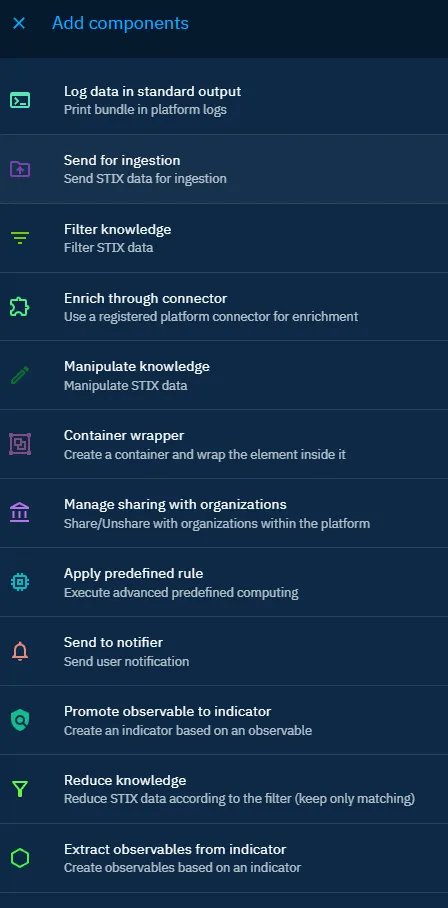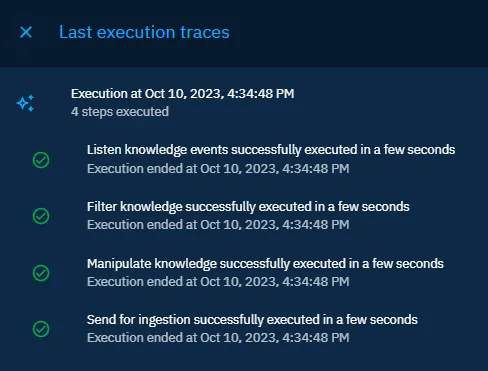Playbooks Automation
Enterprise edition
Playbooks automation is available under the "OpenCTI Enterprise Edition" license. Please read the dedicated page to have all information.
OpenCTI playbooks are flexible automation scenarios which can be fully customized and enabled by platform administrators to enrich, filter and modify the data created or updated in the platform.
Playbook automation is accessible in the user interface under Data > Processing > Automation.
Right needed
You need the "Manage credentials" capability to use the Playbooks automation, because you will be able to manipulate data simple users cannot access.
You will then be able to:
- add labels depending on enrichment results to be used in threat intelligence-driven detection feeds,
- create reports and cases based on various criteria,
- trigger enrichments or webhooks in given conditions,
- modify attributes such as first_seen and last_seen based on other pieces of knowledge,
- etc.
Playbook philosophy
Consider Playbook as a STIX 2.1 bundle pipeline.
Initiating with a component listening to a data stream, each subsequent component in the playbook processes a received STIX bundle. These components have the ability to modify the bundle and subsequently transmit the altered result to connected components.
In this paradigm, components can send out the STIX 2.1 bundle to multiple components, enabling the development of multiple branches within your playbook.
A well-designed playbook end with a component executing an action based on the processed information. For instance, this may involve writing the STIX 2.1 bundle in a data stream.
Validate ingestion
The STIX bundle processed by the playbook won't be written in the platform without specifying it using the appropriate component, i.e. "Send for ingestion".
Create a Playbook
It is possible to create as many playbooks as needed which are running independently. You can give a name and description to each playbook.
The first step to define in the playbook is the “triggering event”, which can be any knowledge event (create, update or delete) with customizable filters. To do so, click on the grey rectangle in the center of the workspace and choose the component to "listen knowledge events". Configure it with adequate filters. You can use same filters as in other part of the platform.
Then you have flexible choices for the next steps to:
- filter the initial knowledge,
- enrich data using external sources and internal rules,
- modify entities and relationships by applying patches,
- write the data, send notifications,
- etc.
Do not forget to start your Playbook when ready, with the Start option of the burger button placed near the name of your Playbook.
By clicking the burger button of a component, you can replace it by another one.
By clicking on the arrow icon in the bottom right corner of a component, you can develop a new branch at the same level.
By clicking the "+" button on a link between components, you can insert a component between the two.
Components of playbooks
Log data in standard output
Will write the received STIX 2.1 bundle in platform logs with configurable log level and then send out the STIX 2.1 bundle unmodified.
Send for ingestion
Will pass the STIX 2.1 bundle to be written in the data stream. This component has no output and should end a branch of your playbook.
Filter Knowledge
Will allow you to define filter and apply it to the received STIX 2.1 bundle. The component has 2 output, one for data matching the filter and one for the remainder.
By default, filtering is applied to entities having triggered the playbook. You can toggle the corresponding option to apply it to all elements in the bundle (elements that might result from enrichment for example).
Enrich through connector
Will send the received STIX 2.1 bundle to a compatible enrichment connector and send out the modified bundle.
Manipulate knowledge
Will add, replace or remove compatible attribute of the entities contains in the received STIX 2.1 bundle and send out the modified bundle.
By default, modification is applied to entities having triggered the playbook. You can toggle the corresponding option to apply it to all elements in the bundle (elements that might result from enrichment for example).
Container wrapper
Will modify the received STIX 2.1 bundle to include the entities into an container of the type you configured. By default, wrapping is applied to entities having triggered the playbook. You can toggle the corresponding option to apply it to all elements in the bundle (elements that might result from enrichment for example).
Share with organizations
Will share every entity in the received STIX 2.1 bundle with Organizations you configured. Your platform need to have declared a platform main organization in Settings/Parameters.
Apply predefined rule
Will apply a complex automation built-in rule. This kind of rule might impact performance. Current rules are:
- First/Last seen computing extension from report publication date: will populate first seen and last seen date of entities contained in the report based on its publication date,
- Resolve indicators based on observables (add in bundle): will retrieve all indicators linked to the bundle's observables from the database,
- Resolve observables an indicator is based on (add in bundle): retrieve all observables linked to the bundle's indicator from the database,
- Resolve container references (add in bundle): will add to the bundle all the relationships and entities the container contains (if the entity having triggered the playbook is not a container, the output of this component will be empty),
- Resolve neighbors relations and entities (add in bundle): will add to the bundle all relations of the entity having triggered the playbook, as well as all entities at the end of these relations, i.e. the "first neighbors" (if the entity is a container, the output of this component will be empty).
Send to notifier
Will generate a Notification each time a STIX 2.1 bundle is received.
Promote observable to indicator
Will generate indicator based on observables contained in the received STIX 2.1 bundle.
By default, it is applied to entities having triggered the playbook. You can toggle the corresponding option to apply it to all observables in the bundle (e.g. observables that might result from predefined rule).
You can also add all indicators and relationships generated by this component in the entity having triggered the playbook, if this entity is a container.
Extract observables from indicator
Will extract observables based on indicators contained in the received STIX 2.1 bundle.
By default, it is applied to entities having triggered the playbook. You can toggle the corresponding option to apply it to all indicators in the bundle (e.g. indicators that might result from enrichment.
You can also add all observables and relationships generated by this component in the entity having triggered the playbook, if this entity is a container.
Reduce Knowledge
Will elagate the received STIX 2.1 bundle based on the configured filter.
Monitor playbook activity
At the top right of the interface, you can access execution trace of your playbook and consult the raw data after every step of your playbook execution.



